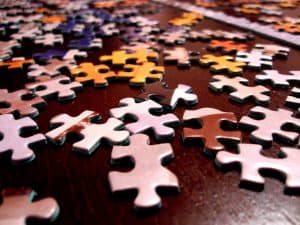In a world dominated by digital screens and constant connectivity, the allure of traditional activities like solving jigsaw puzzles has endured. The question that often arises is, “Are jigsaw puzzles good for adults?” The answer is a resounding yes. Engaging in the art of piecing together a jigsaw puzzle offers a myriad of benefits that span cognitive, emotional, and even physical dimensions.
Are Jigsaw Puzzles Good for Adults: Benefits
Cognitive Benefits of Jigsaw Puzzles Solving
Solving jigsaw puzzles is not just a leisurely pastime; it’s a workout for the brain. It stimulates problem-solving skills, promoting a mental state that involves trial and error testing. The very act of fitting puzzle pieces together engages cognitive skills, improving fine motor skills, and enhancing visual spatial reasoning. This mental exercise is particularly crucial for adults between the ages of 18-34, as it helps maintain and sharpen problem-solving skills.

Enhanced Cognitive Skills and Combatting Cognitive Decline
Engaging in the puzzle-solving process regularly has been linked to combatting cognitive decline. Studies suggest that adults who regularly participate in activities that challenge the brain, such as solving jigsaw puzzles, are better equipped to stave off cognitive decline as they age. The brain, much like a muscle, needs regular exercise to stay in top form.
Cognitive Health and Improved Memory
Jigsaw puzzles naturally induce a state where the brain releases dopamine, a neurotransmitter associated with pleasure and reward. The act of completing puzzles not only provides a sense of accomplishment but also contributes to improved short-term memory. This is a critical aspect, especially for adults concerned about memory loss and conditions like Alzheimer’s disease.
Stress Relief and Mental Well-being
Beyond cognitive benefits, solving jigsaw puzzles is a stress-relieving activity. It acts as a focused meditation, allowing individuals to momentarily disconnect from the demands of everyday life. The process of piecing together a puzzle requires concentration, self-control, and a trial-and-error approach, all of which contribute to lower stress levels.
Health Benefits Beyond the Mind
The benefits of doing jigsaw puzzles extend beyond the cognitive realm. Numerous studies have highlighted the positive impact on physical health, including lowered blood pressure. Engaging in puzzle solving is not just a fun way to pass time but also a low-cost activity that can be enjoyed by the whole family.
The Science Behind the Puzzle
Neural Connections and Brain Health
Solving a jigsaw puzzle is like a workout for the brain. It activates multiple neural connections as different regions of the brain collaborate to analyze shapes, colors, and patterns. This process enhances overall brain health, promoting a wakeful mind that is better prepared to navigate the challenges of the outside world.

Entering the Alpha State: A Near Dreamlike State
The repetitive and rhythmic nature of puzzle-solving has been associated with entering the alpha state, akin to a near dreamlike state. In this state, the mind becomes more receptive to creative thoughts and enhanced recollection. It’s a mental space that stands in stark contrast to the constant stimuli of today’s digital lifestyle.
Improving Memory and Concentration
As individuals immerse themselves in the puzzle-solving experience, their concentration improves, and they enter a state where memory is sharpened. The activity involves testing hypotheses, engaging the subconscious mind, and experiencing individual moments of deep concentration that contribute to enhanced memory.
Jigsaw Puzzles: A Healthy Addiction
The benefits of doing jigsaw puzzles are not restricted to a specific age group; they are accessible to everyone. Engaging in puzzle-solving on a regular basis creates a healthy addiction, promoting mental speed and agility. It offers a fun and interactive way to keep the mind active, reaching deeper levels of thought and problem-solving.
Final Thoughts
The question “Are jigsaw puzzles good for adults?” can be confidently answered with a resounding yes. Beyond being an enjoyable pastime, jigsaw puzzles offer a host of cognitive and health benefits. They are a holistic activity that engages the mind, sharpens problem-solving skills, and contributes to overall well-being. So, the next time you find yourself staring at a pile of puzzle pieces, remember that you’re not just putting together an image – you’re actively investing in the health of your brain and body. What was your first jigsaw puzzle? Share your comments below?

